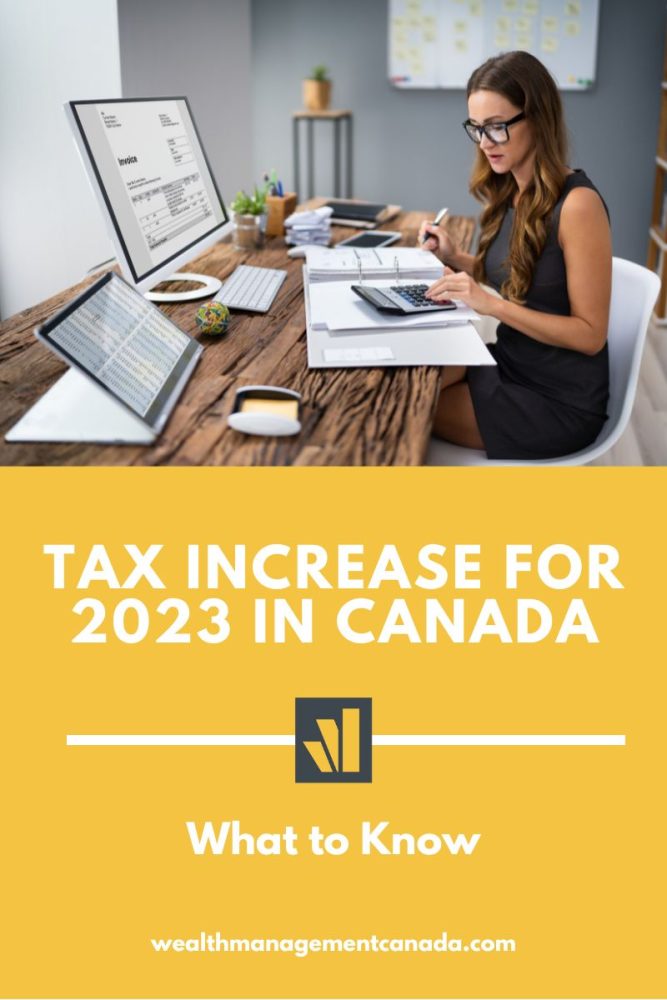The federal tax increase for 2023 in Canada is high by an indexation factor of 6.3%. In other words, Canadians may pay a lower rate on their income because wages are not as high as inflation. For example, residents earning less than $53,359 in taxable income, but above the basic amount of $15,000, will be subject to a 15% tax rate.
In 2022, Canadians experienced high inflation levels due to a shift in the global economy and supply chain disruptions, causing an index and adjustment in Canada’s tax brackets. If the cost of living and wages is going up, then taxes usually rise too. With continuously skyrocketing inflation rates, the federal tax brackets for 2023 are continually increasing compared to previous years. There are other areas of the tax system where Canadians can experience an increase for the 2023 tax year as well. Keep reading to learn more!

Table of contents
Why are there tax increases for 2023 in Canada?
Each year, the Canada Revenue Agency (CRA) collects federal income taxes using a marginal tax rate system. Every year, there are modifications to the tax brackets, including the income thresholds and rates. Canada gradually changes the federal income tax brackets to account for inflation and other economic conditions.
Since the inflation increase in 2022, the tax brackets were considerably affected, resulting in a 6.3% increase by 2023. As inflation rises, the cost of consumer goods gradually increases with associated wages. Tax rates, tax credits, and payments in Canada index to the inflation rate.

START WORKING WITH A WEALTH MANAGER NOW
Indexing tax brackets to inflation is a great idea as it reduces the amount of taxes you pay. Moreover, with the increase in tax brackets, the Canadian government ensures lower-income earners are not unfairly taxed at a high rate. In 2024, Canada’s inflation rates are likely to decrease, leading to downward changes in federal income tax brackets.
According to CRA data, below is a table showing how the federal government’s income tax brackets have increased over the past few years, accounting for inflation levels:
| Year | 2020 | 2021 | 2022 | 2023 |
| Indexation Increase % | 1.9% | 1.0% | 2.4% | 6.3% |
Related Reading: When it comes to saving for retirement, how much is enough?
Did income tax rates increase in 2023?
Yes, there was a tax increase in 2023 for Canada. One of the highlights of Canada’s tax system is the change to the federal income tax brackets this upcoming tax year. Depending on what you earn yearly, you can fall into any of the five federal and provincial tax brackets taxed at different rates. The question is, what are these tax rates?
The common tax system in Canada is the graduated tax rate, which ensures that the increased income amount is taxed at a higher tax bracket than lower income counterparts. For instance, if you earn up to $60,000 a year, the first $53,359 of your income would be taxed at 15%. The remaining part of your income will fall into the next tax bracket, taxed at 20.5%. As you can see, the more money you earn, the more tax you pay.
The federal income tax brackets and tax rates for 2023/2024 include:
- Income earned up to $53,359 taxed at 15%
- Income earned at $53,359 up to $106,717 taxed at 20.5%
- Income earned at $106,717 up to $165,430 taxed at 26%
- Income earned at $165,430 up to $235,675 taxed at 29%
- Income earned at $235,675 and above taxed at 33%
Keep in mind that there will be similar changes to provincial and territorial tax brackets for the 2023/2024 tax year.
Related Reading: List of Countries by Tax Rate
What tax changes are coming in 2023 for Canada?
The Government of Canada has made some changes to the tax brackets for the year 2023. Mainly, the income amounts have shifted upwards in the tax brackets, but the rates are the same, as we saw above. However, there are other anticipated changes to the tax system for 2023 besides personal income tax. Let’s find out more below:
1. Carbon Tax Increase for 2023
The Government Carbon Tax is a major part of Canada’s multi-year carbon pricing system. According to the Government of Canada, the following are rates and effective dates for carbon charge on natural gas:
- April 1, 2019: $39.10 per 10³m³ (approximately $1.00/GJ)
- April 1, 2020: $58.70 per 10³m³ (approximately $1.50/GJ)
- April 1, 2021: $78.30 per 10³m³ (approximately $2.00/GJ)
- April 1, 2022: $97.90 per 10³m³ (approximately $2.50/GJ)
- April 1, 2023: $123.90 per 10³m³ (approximately $3.25/GJ)
- April 1, 2024: $152.50 per 10³m³ (approximately $4.00/GJ)
- April 1, 2025: $181.10 per 10³m³ (approximately $4.75/GJ)
- April 1, 2026: $209.70 per 10³m³ (approximately $5.50/GJ)
In the past year, the Government confirmed that Canada’s carbon price will continue to increase by $15 after 2022. This leads to a price of $170 per metric ton till 2030.

START WORKING WITH A WEALTH MANAGER NOW
2. Alcohol Tax Increase & Tobacco Tax Increase in 2023 for Canada
According to the Government, as of April 2023, alcohol in Canada will be very expensive, causing a hike in alcohol tax. This is a result of an annual escalator tax that allows the federal government to raise taxes on alcohol in response to inflation. The federal alcohol excise duty was set to increase by 6% but due to pressure on the alcohol industry, the government decided to cap it at 2%.
The tobacco excise duty and tax rate is $0.00938 per cigarette ($1.876 per carton of 200 cigarettes). This duty will not apply to tobacco products imported by an individual for personal use. However, it applies to tobacco products stamped per the Act and on which excise duty is imposed under that Act.
3. Payroll Tax Increase for 2023 in Canada
Payroll taxes have increased in 2023, and are likely to increase for 2024 as well. The Employment Insurance (EI) rate has increased from 1.58% to 1.63%, based on maximum yearly insurable of earnings of $61,500. As for Canada Pension Plan (CPP) rates, it has increased from 5.7% to 5.95% for employees. As for self-employed people, the increase is from 11.4% to 11.9%.
4. Child Tax Benefits Increase in 2023
According to the Government of Canada, Canada child benefits (CCB) and related payments will increase in 2023. Eligible families will receive more than 6.3% of what they got during the last years of child benefit. Even though taxes are going up, so are benefits!
For the 2023 and 2024 benefit years, a maximum annual benefit for a child under 6 is set to increase from $6,997 to $7,437. This is a $440 jump from the former year. Benefits for a child aged 6 through 17 will also increase from $5,903 to $6,275, which is an extra $372.
5. Property Tax Increase in 2023
Various provinces in Canada offer different property tax rates in 2023. Property taxes increase by 10.7%, on average, in Vancouver and 5.5% in Toronto. This results in an additional 1.5% increase rate in building transit levies and housing projects.
If you are purchasing a home that is assessed at the value of $695,268 in Canada. The property tax on the home will be $3,569. Homeowners are expected to see a $183 hike on average before other recordings of the increase rates in the budget proposal.
Victoria is in search of ways to raise revenue that will keep this year’s tax hike to 6.9%. The drop from a 7% increase to a 6.9% increase is expected to save the average household and business $84 and $215, respectively.
This year, Montreal residents should expect an average tax bill increase of 4.1%. In the longest history, 4.3% has to be the biggest jump to date. Besides, since the total tax value of homes in Montreal increased, it has had a major impact on the city’s new property assessment roll.
Other cities, municipalities and townships across Canada might see property tax increases as well. Keep an eye out for local news and other information from government entities to know what to expect for the coming year.
Related Reading: Canada Inheritance Law: How it Works
Preparing for the Tax Increase for 2023 in Canada
Despite the economic conditions in Canada, tax brackets are indexed for inflation to help keep the tax rate steady. You need to be aware of the tax increase in 2023 for Canada, to enable you to plan for the year and maximize your tax deductions. In addition, being aware of tax increases can help you make more informed decisions about employment, business operations or investments.
The updated tax brackets in this article will help your income earnings or first threshold for your tax rate in 2022, which will be significantly high in 2023. If you are quite uncertain of how to prepare for tax changes, it will be advisable to speak with a wealth manager.
Read More: Income Splitting Canada